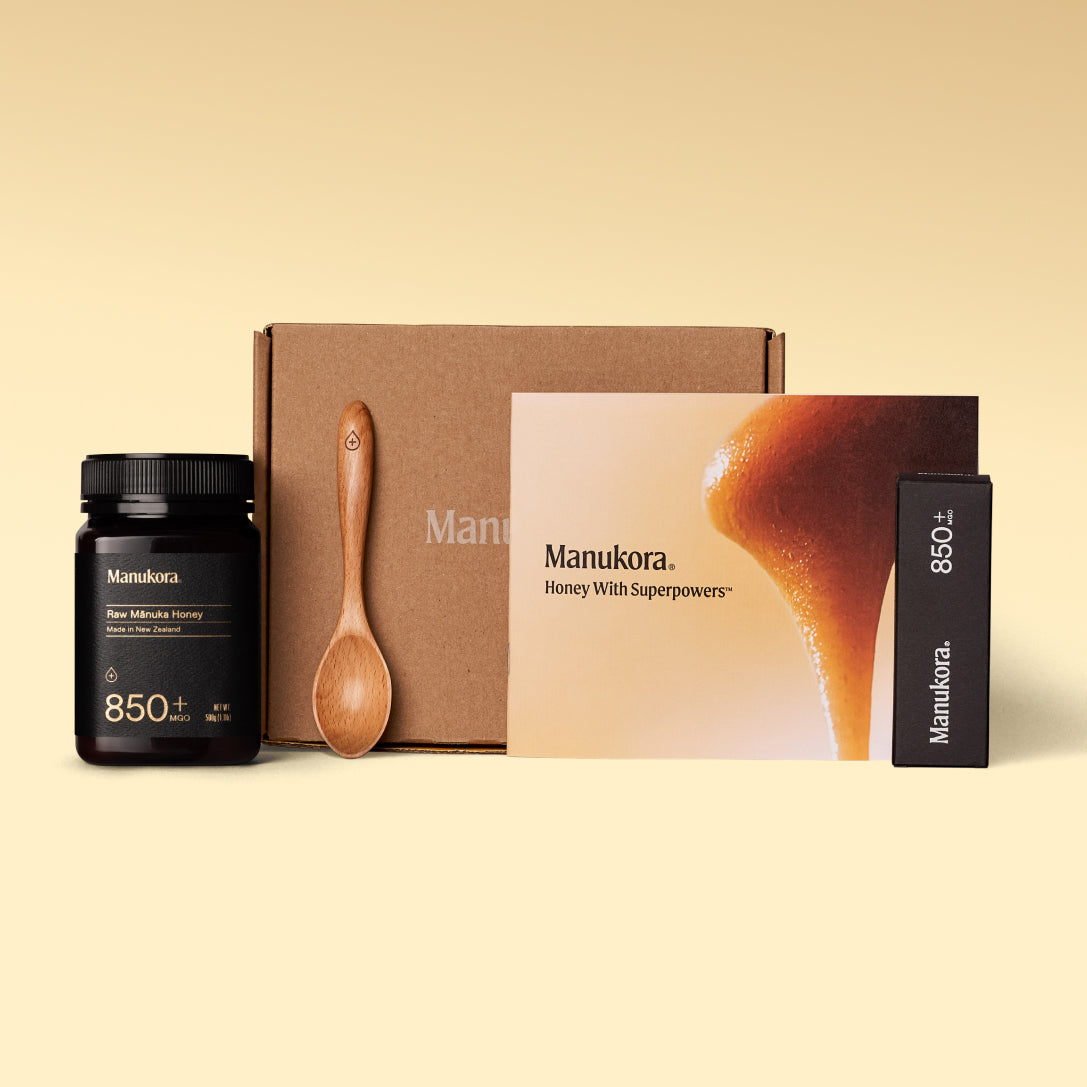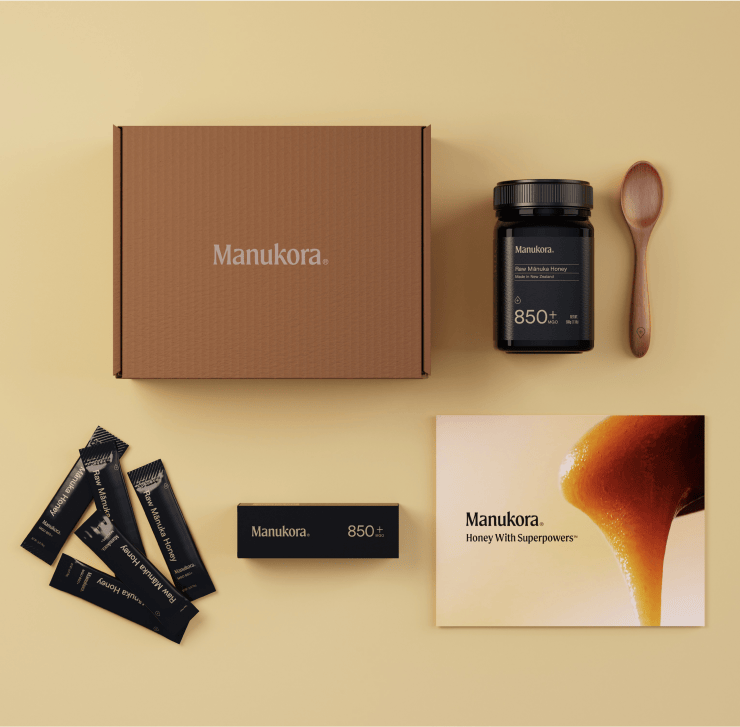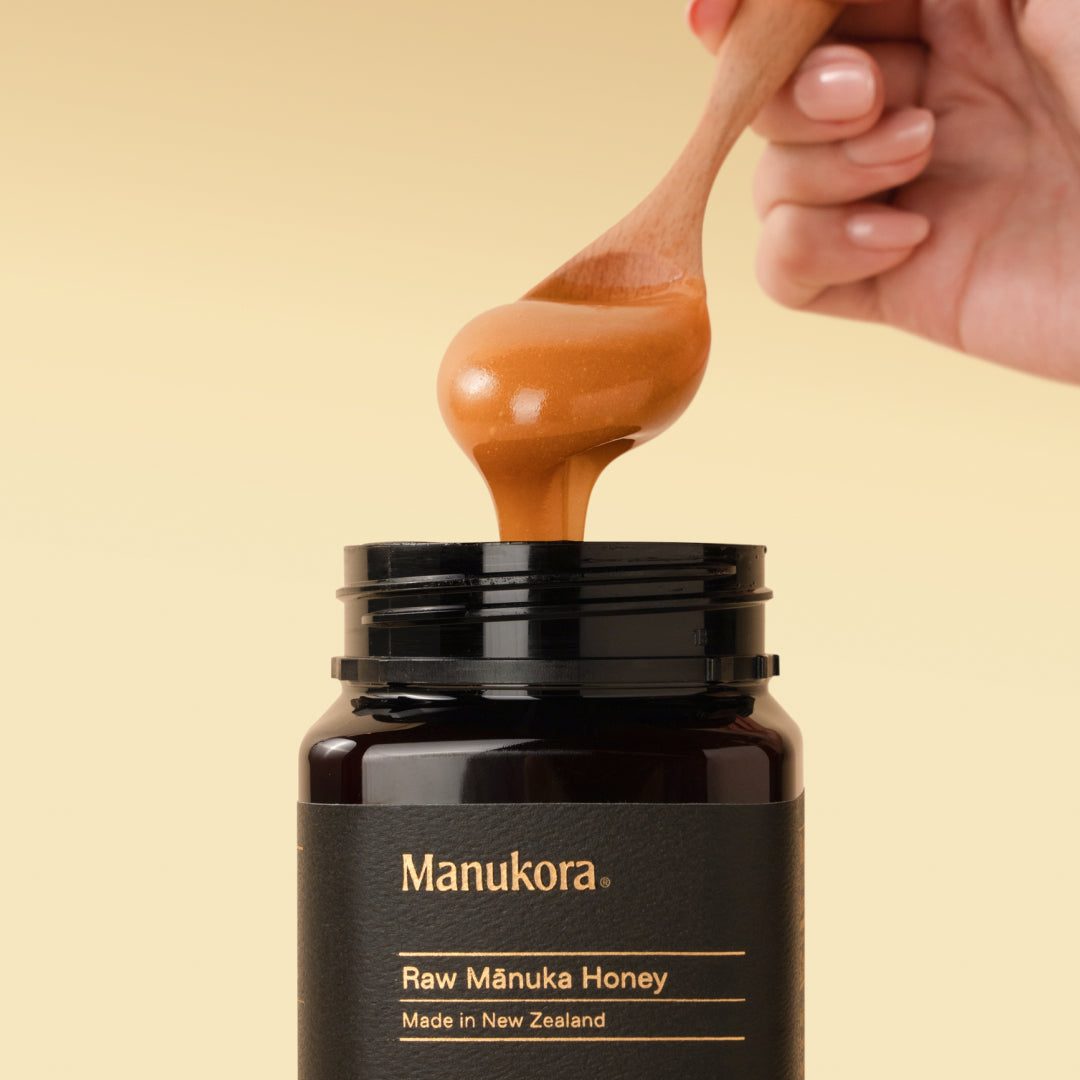Executive Summary:
-
The natural compounds in honey and cinnamon exhibit similar properties, including antioxidant, anti-inflammatory, and immune-supporting properties.
-
Scientific studies suggest that the combination of honey and cinnamon is complementary, with antibacterial and anti-inflammatory properties reported.
-
High-quality honey, like Manuka honey, and Ceylon cinnamon can easily be incorporated into a wellness routine by adding them to various beverages and meals.
Cinnamon and Honey: Understanding Their Combined Health Benefits
Honey and cinnamon are so much more than a delicious flavor combination. Traditionally, the properties of cinnamon and natural honey have been said to support wellness ---but without scientific evidence to back it up.
Now, thanks to scientific studies, we know that the nutrients present in honey and cinnamon possess unique properties that support health and wellness—but what effect do they have when combined?
The tradition of combining honey and cinnamon spans cultures and centuries - long before science began to understand the complex natural compounds these two treasures contain.
While studies are limited, there's enough evidence to suggest that honey and cinnamon are a complementary combination. So, let's dive in and piece together the facts. How can you enjoy all the properties that honey and cinnamon offer?
Cinnamon: A Brief Overview
Cinnamon is a spice that is made from the bark of the Cinnamomum tree, which is native to India and Sri Lanka. It has been used in a number of applications dating all the way back to Ancient Egypt, where it was used in the mummification process. Yet, as many of us know, this isn't all that cinnamon is good for.
Traditionally, cinnamon was and is used to flavor various sweet and savory dishes. It has also been used in traditional wellness practices around the world.
Nutrients Found in Cinnamon
Cinnamon is a blend of water, carbohydrates, fiber, and a source of various vitamins and minerals, such as vitamin A, magnesium, calcium, and iron.
Of particular interest, though, is cinnamaldehyde—one of the organic compounds found in cinnamon that gives it its unique flavor, aroma, and distinctive properties.
Types of Cinnamon: Choosing the Right Variety
Not all cinnamon is created equal. Understanding the differences between varieties can help you select the most appropriate type for your wellness routine:
|
Type |
Scientific Name |
Origin |
Flavor Profile |
Coumarin Content |
Best Used For |
|
Ceylon (True) Cinnamon |
Cinnamomum verum |
Sri Lanka |
Mild, sweet, delicate |
Very low |
Daily consumption, sweet dishes |
|
Cassia Cinnamon |
Cinnamomum cassia |
China |
Strong, spicy |
High |
Occasional use, savory dishes |
|
Saigon Cinnamon |
Cinnamomum loureiroi |
Vietnam |
Strong, sweet, spicy |
High |
Occasional use, baking |
|
Indonesian Cinnamon |
Cinnamomum burmannii |
Indonesia |
Medium strength |
Medium |
Occasional use, beverages |
Due to its low coumarin content (a compound that can be harmful in large amounts), Ceylon cinnamon is the preferred choice for regular consumption and is what we recommend pairing with Manukora Manuka honey.
The Properties of Cinnamon - What Science Says
Cinnamon has been widely studied, and the results are impressive! A collection of studies confirms that the compounds found in cinnamon (cinnamaldehyde, cinnamic acid, and cinnamate) offer the following properties:
-
Antioxidant properties
-
Anti-fungal properties
-
Support cardiovascular health
-
Support cellular health
-
Support healthy glucose metabolism
-
Support healthy levels of inflammation
It's easy to see why cinnamon is celebrated all over the world. With its unique flavor, and properties, this spice packs quite the punch.
Honey's Health Profile
Like cinnamon, honey has also been enjoyed and praised for its delicious flavor and beneficial nutrients for hundreds of years.
Honey contains water, vitamins, and minerals but is mostly a collection of sugars. Many of the more complex ones—polysaccharides—behave in unique and beneficial interesting ways. It also contains polyphenols that contribute to its beneficial properties.
Honey that is natural, unprocessed, and non-heat-treated exhibits the following properties, most of which complement and overlap with the beneficial properties of cinnamon:
-
Antioxidant properties
-
Supports healthy blood sugar
-
Supports cellular health
-
Supports healthy weight management
-
Supports healthy cholesterol levels
-
Supports the immune system
-
Supports nerve health
-
Supports liver health
Honey and cinnamon taste delicious when combined, but their mutual properties make them an ideal pair to support your body in many different ways—and science agrees! So, let's take a closer look at combining these two power foods together.
The Combined Properties of Cinnamon and Honey
Combining honey and cinnamon is a logical and practical way to support health and wellness in a natural way. For example, both contain nutrients compounds that offer antioxidant properties and support regular blood sugar levels.
Surprisingly, studies suggest that when you combine honey and cinnamon, the combination offers complementary properties. The studies are limited, but the results so far are exciting. So, how do the combined properties of cinnamon and honey stack up?
When we look to nature for wellness, we often find that traditional combinations like honey and cinnamon hold wisdom that modern science is only beginning to understand and validate.
Honey and cinnamon have antibacterial properties when combined.
Honey and cinnamon have a long history of traditional use in various cultures. Emerging research has explored how the combination of honey and cinnamon behaves differently from either ingredient alone, particularly in laboratory settings involving common bacteria.
While these early findings are intriguing, more research is needed to understand how these ingredients may interact in the body. What we do know is that both honey and cinnamon contain naturally occurring compounds that have been studied for their potential to support the body’s inflammatory response—an important factor in maintaining joint health and everyday comfort.
Adding honey and cinnamon to your routine can be a delicious and enjoyable way to support your overall wellness, while we continue to learn more about this fascinating duo.
Morning Ritual: Starting Your Day with Cinnamon and Honey
A morning ritual with honey and cinnamon can be a delightful way to begin your day. Here's a simple routine many people find enjoyable:
-
Prepare: Mix 1 teaspoon of Manukora Manuka honey with ½ teaspoon of Ceylon cinnamon in warm (not hot) water
-
Hydrate: Drink this mixture on an empty stomach, about 30 minutes before breakfast
-
Reflect: Take a moment to be mindful and set your intentions for the day
-
Continue: Follow with your normal breakfast when ready
This simple morning practice not only provides a moment of mindfulness but also introduces these natural compounds into your system at the start of your day when your body may be most receptive.
Practical Ways to Incorporate This Duo
Cinnamon and honey are naturally delicious, so incorporating them into your diet is a real treat. A helpful rule of thumb is to use half the amount of cinnamon as honey. So, simply put: if you take two teaspoons of honey, add one teaspoon of cinnamon.
How to Take Honey and Cinnamon
Here are a few practical ways to enjoy the synergistic properties of this powerful pair—but the possibilities are almost endless.
-
Drink honey cinnamon water: add two teaspoons of honey and one teaspoon of cinnamon to two cups of slightly warm water on an empty tummy first thing in the morning—or before a workout.
-
Add honey and cinnamon to your favorite smoothie.
-
Blend honey and cinnamon into butter or coconut oil and spread it on toast.
-
Honey and cinnamon are delicious additions to a bowl of oatmeal.
-
Drizzle honey and sprinkle cinnamon over a freshly sliced apple.
Seasonal Applications for Honey and Cinnamon
The honey and cinnamon combination can be particularly valuable during different seasons:
|
Season |
Recipe Suggestion |
Properties |
|
Spring |
Honey-cinnamon infused water with fresh mint |
Refreshing, helps support seasonal wellness |
|
Summer |
Chilled cinnamon honey yogurt with berries |
Cooling, helps support digestive comfort |
|
Fall |
Warm apple slices with honey-cinnamon drizzle |
Warming, helps support seasonal transition |
|
Winter |
Cinnamon honey in warm milk |
Comforting, helps support winter wellness |
By adapting your honey and cinnamon consumption to the seasons, you can address your body's changing needs throughout the year in a natural, supportive way.
Helpful Tips for Benefiting from Honey and Cinnamon
Because of the delicate compounds present in honey and cinnamon, you need to keep a few things in mind in order to enjoy their full potential, including:
-
Avoid high temperatures—even though honey and cinnamon are delicious in hot tea, the high temperature breaks down many of honey's beneficial nutrients.
-
Not all cinnamon is the same. Opt for (True) Ceylon cinnamon rather than Cassia cinnamon, as Cassia cinnamon contains high amounts of a toxic chemical, coumarin, whereas Ceylon cinnamon only contains traces.
-
Not all honey is the same. Take time selecting a honey that is pure, natural, unprocessed, undiluted, and non-heat treated (non-irradiated). The closer your honey is to what was harvested from the hive, the better.
-
Certain honey, like Manukora's Manuka honey from New Zealand, contains additional antioxidant and antimicrobial nutrients due to its unique origins from the nectar of the Manuka Tea Tree. Choose the best quality honey you can afford—it's worth every cent.
Recommended Manuka Honey Grades for Different Uses with Cinnamon
|
MGO Grade |
Flavor Profile |
Best Pairing With Cinnamon |
Suggested Use |
|
MGO 600+ |
Mild, versatile |
Light dusting of cinnamon |
Everyday use in beverages and breakfast |
|
MGO 850+ |
Rich, distinctive |
Equal partnership with cinnamon |
Morning ritual, pre-workout support |
|
MGO 1000+ |
Bold, complex |
Balanced with premium Ceylon cinnamon |
Targeted wellness support |
Each MGO grade offers different flavor intensities that can complement cinnamon in unique ways. Experiment to find your preferred combination based on your taste preferences and wellness goals.
Frequently Asked Questions About Honey and Cinnamon
How much honey and cinnamon should I consume daily?
We recommend 1-3 teaspoons of honey daily, paired with ½-1½ teaspoons of cinnamon, depending on your personal taste and preferences. Start with smaller amounts and adjust as needed.
Is it better to consume honey and cinnamon together or separately?
While both honey and cinnamon have their own individual properties, research suggests their compounds may work in complementary ways when consumed together. However, they can also be enjoyed separately.
What time of day is best for consuming honey and cinnamon?
Many people prefer taking honey and cinnamon first thing in the morning on an empty stomach, but they can be enjoyed throughout the day as part of meals or snacks.
Can I add honey and cinnamon to hot beverages?
It's best to let hot beverages cool to a warm temperature (below 40°C/104°F) before adding honey to preserve its natural compounds. Cinnamon can be added at any temperature.
Which type of cinnamon is best to pair with Manuka honey?
Ceylon (true) cinnamon is recommended for regular consumption with Manuka honey due to its lower coumarin content and more delicate flavor that complements the complex taste profile of Manuka honey.
Honey and cinnamon aren't just a delicious pairing; they're a natural combination that supports your body in several ways. Take time to consider the value of your future health and make an informed choice that supports your lifestyle and your future goals.
Remember to choose cinnamon and honey that reflect the quality your body deserves—your wellness routine will get a whole lot sweeter!
Sources:
Cinnamon Nutrition Facts - URMC
Cinnamon: A Multifaceted Medicinal Plant - PMC
Composition, functional properties and safety of honey: a review - PMC
The synergistic effect of honey and cinnamon against Streptococcus mutans bacteria - science direct


















